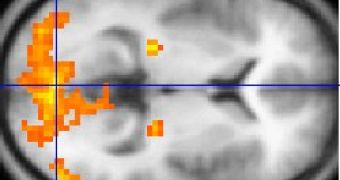Princeton's researchers have studied how the brain functions while we recall certain images. They have discovered that when we remember something we "travel back in time" to the moment and into context when we have formed that memory. In other words, memory isn't like a file cabinet where we store our memories. The way memory functions can be described in the following way: When we are in a certain situation, certain things attract our attention and generate emotions, thoughts etc. When we are recalling something we revisit in our imagination that certain situation and the brain generates the same emotions, thoughts etc. once again (or maybe not exactly the same emotions and thoughts but some which resemble them fairly closely).
The study has been coordinated by Kenneth Norman, an assistant psychology professor and by Sean Polyn, who earned his Ph.D in psychology from Princeton in 2005 and is a now a postdoctoral researcher at the University of Pennsylvania. They collaborated with Jonathan Cohen, director of Princeton's Center for the Study of Brain, Mind and Behavior, and Vaidehi Natu, a researcher in Norman's lab.
They used a technique of brain scan called fMRI (functional magnetic resonance imaging) that had been developed during the '90s. This technique detects those areas of the brain which are the most oxygenated and it is capable of showing in real time the activity of the brain (it is assumed that the most active parts of the brain use the most oxygen, thus by detecting which are the most oxygenated parts of the brain one detects which areas have the most intense cerebral activity).
The participants in the experiment were shown 90 images in three categories, celebrities faces, famous locations and common objects, and then they were asked to recall them. The scientists used fMRI for observing the participants' brain activity patterns while they were shown the images and while they recalled the images. The three classes of images lead to three distinct classes of brain activity - in other words, the brain activity when we are seeing or recalling a human face is different from the one when we are seeing or recalling a location or a common object.
Then, two interesting facts were discovered: First of all, they observed a high correlation between the initial cerebral activity pattern (when the participants were shown the images) and the later cerebral activity pattern (when the participant were recalling the images). This brain activity isn't localized in a certain place in the brain, it has a very complex pattern - in other words, a certain memory isn't stored in a certain place, it is a complex combination of reactions. These things suggest that the remembering process is a sort of "mental time travel". "When you try to remember something that happened in the past, what you do is try to reinstate your mental context from that event," said Norman. "If you can get yourself into the mindset that you were in during the event you're trying to remember, that will allow you to remember specific details. The techniques that we used in this study allow us to visualize from moment to moment how well subjects are recapturing their mindset from the original event."
Another interesting fact discovered by the Princeton team was that approximately five seconds before the participant actually remembered a certain image his brain had a pattern of cerebral activity specific for the entire class of that image. For example if one remembered a certain location, the general pattern of locations first appeared. This shows that when we recall something we first recall the general aspects and only afterwards we recall the specific details. By monitoring the participants' brain activity the researchers managed to guess what particular image they would recall before the participants themselves became aware of the image.
It is hoped that such studies will have more than just a theoretical impact but that they will also help curing some of the illnesses which involve memory losses (such as Alzheimer's disease).

 14 DAY TRIAL //
14 DAY TRIAL //